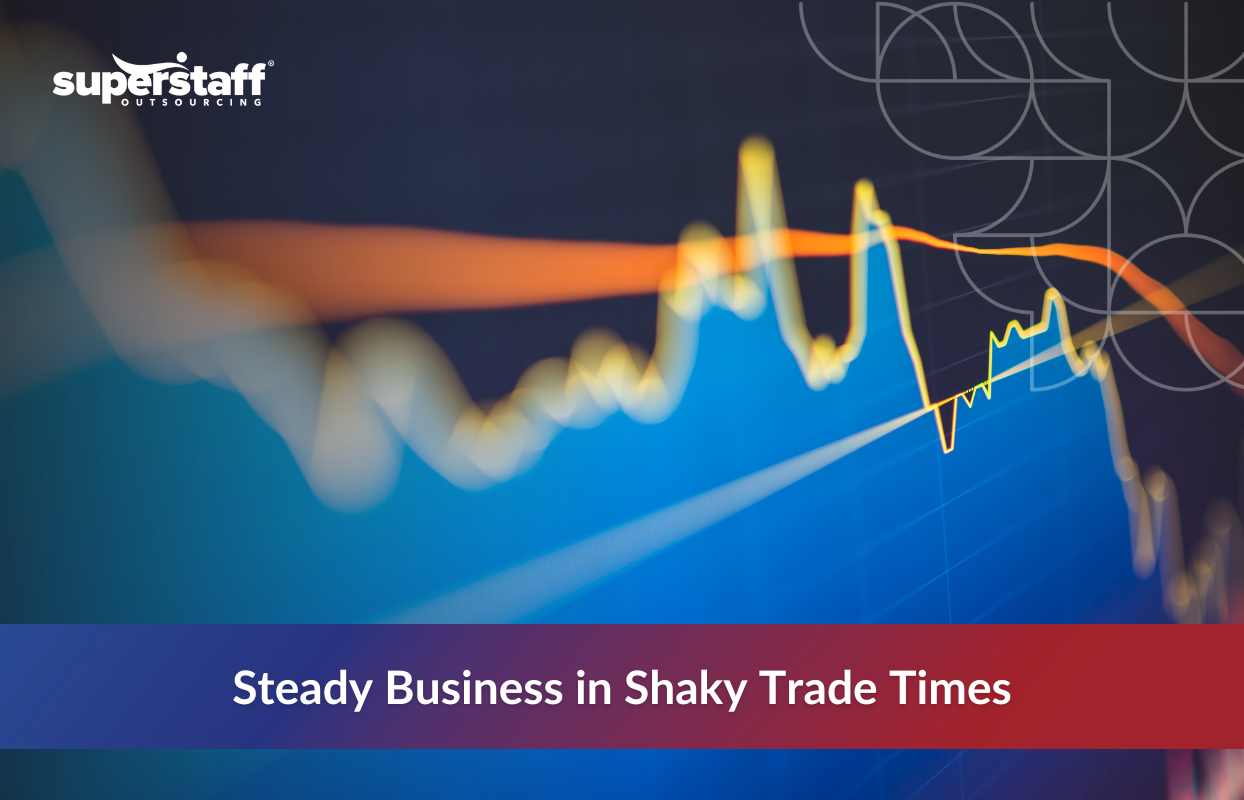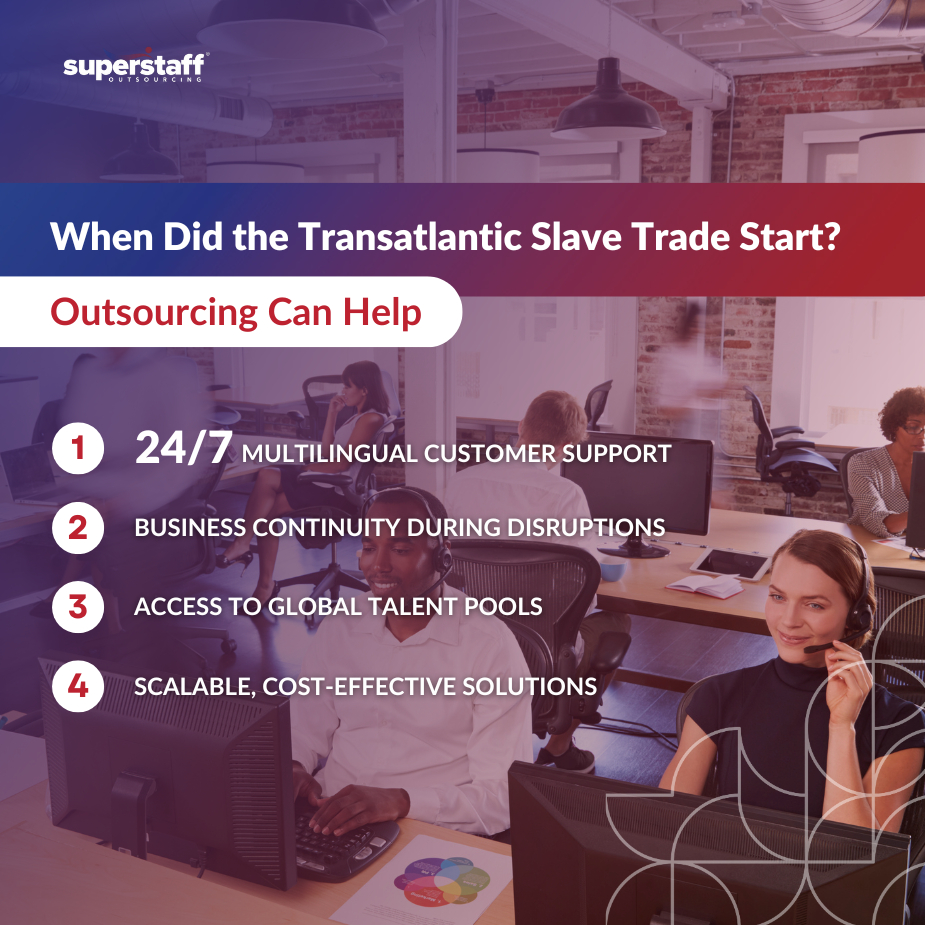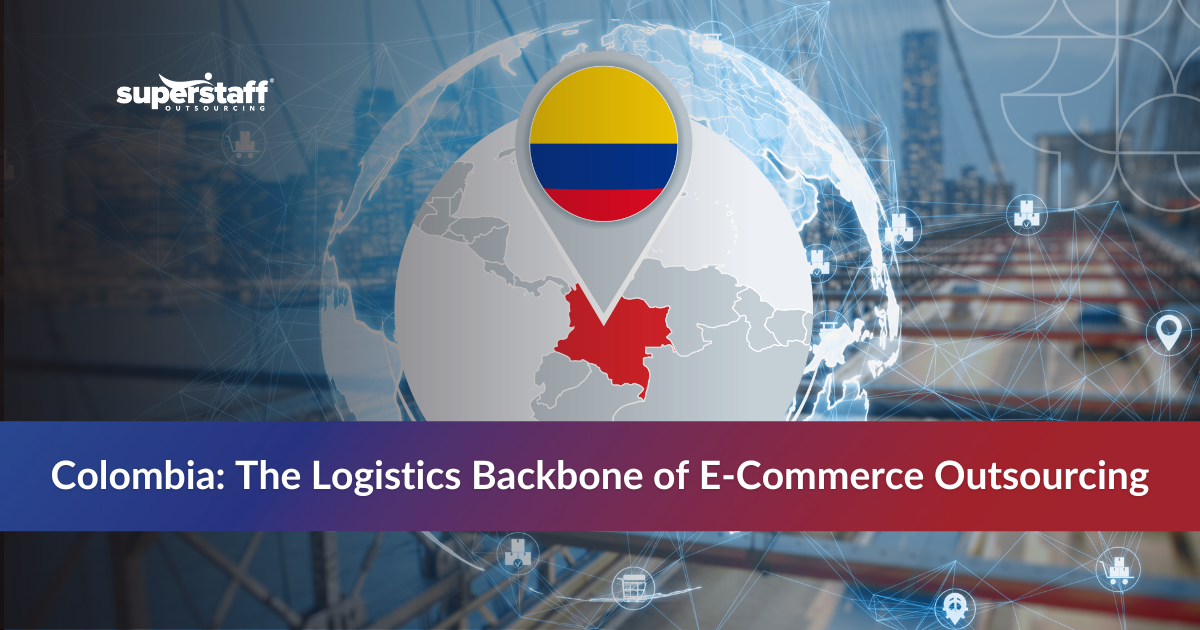
Trade between the U.S. and Europe has spanned centuries. If you’ve ever wondered, “When did the transatlantic slave trade start?”—the answer goes back to the 1400s, when ships first began crossing the Atlantic, some carrying goods, others tragically transporting enslaved people. This dark chapter highlights the long, complex history of transatlantic trade.
Today, that relationship faces a different kind of turbulence.
Rising costs, political tensions, complex trade regulations, and ongoing supply chain disruptions are making it harder for businesses on both sides of the Atlantic to operate with confidence. As transatlantic trade shifts, companies are left asking: “How do we keep operations running smoothly when the rules keep changing?”
For many, the answer is outsourcing.
Strategic outsourcing is emerging as a powerful solution for navigating uncertainty. By tapping into global talent and specialized services, businesses in the U.S. and Europe are staying agile, cutting costs, and future-proofing their operations. Curious how it works—and why so many companies are shifting their strategies?
Read on to discover how outsourcing can turn trade uncertainty into opportunity.
Transatlantic Trade Tensions: What’s Making Business Harder
The U.S. and the European Union have worked together in trade for a long time. But lately, things have become tense. Disagreements over digital taxes, environmental rules, and possible new tariffs are making it harder for businesses to trade smoothly.
Several disagreements are putting pressure on trade between the two regions, including:
- Ongoing disputes over digital service taxes
- Uncertainty around carbon border tariffs and environmental trade rules
- Possible new tariffs or changes to trade deals following elections
Because of these issues, a huge amount of money is at stake. Ongoing trade tensions are now putting $9.5 trillion worth of business between the U.S. and Europe at risk. That’s how much could be affected if the conflict continues.
As rules keep changing, companies are facing real problems: delayed shipments, rising costs, and more uncertainty. It’s harder than ever to make long-term plans or invest across borders with confidence.

Outsourcing as the Key to Handling Transatlantic Trade Shifts
When trade between the U.S. and Europe becomes uncertain, many businesses find themselves stuck—facing delays, rising costs, and constant changes in rules. Trying to manage everything in-house can be overwhelming and expensive.
The impact of trade shifts on outsourcing is becoming increasingly clear, as more companies turn to external partners to stay on track amid rising costs, regulatory changes, and supply chain disruptions.
Outsourcing means working with trusted teams in other countries to handle essential tasks like customer service, accounting, IT support, etc. It’s not just about saving money—it’s about keeping your business running, even when trade conditions aren’t ideal.
With outsourcing, businesses can:
- Avoid the stress of dealing with cross-border logistics issues
- Protect themselves from sudden tariff hikes or added fees
- Stay compliant with new regulations without slowing down
- Access skilled workers without having to deal with local hiring challenges
Instead of waiting for trade issues to calm down or trying to do everything internally, outsourcing gives businesses breathing room. It’s a flexible, cost-effective way to keep moving forward without missing a beat.
In short, when trade gets tough, outsourcing is the smart fallback—helping companies stay stable, focused, and ready for whatever comes next.
The Role of Offshore Teams in Ensuring Service Continuity
No matter what’s going on in the world, customers still expect great service, and businesses that can deliver it, standout.
That’s where offshore teams come in. Countries like the Philippines and Colombia have become go-to hubs because they know how to keep things running, even when everything else feels up in the air. These teams help companies:
- Offer round-the-clock support in multiple languages
- Keep service steady during supply chain delays, strikes, or global events
- Work with people who understand your market and take pride in getting things right
When you outsource support, tech help, or back-office tasks, your customers stay happy—even if things behind the scenes get messy. It’s one of the smartest ways to stay strong when the pressure’s on.
Which Industries Benefit Most?
Not all industries feel the effects of transatlantic trade shifts in the same way, but some are hit harder than others. The good news? These same industries are also the ones that can gain the most from outsourcing. By moving certain functions to trusted external providers, companies can lighten the load, reduce costs, and stay agile in a rapidly changing market.
Here’s how outsourcing can make a difference in key sectors:
- Manufacturing: Outsource procurement, compliance support, and coordination to reduce delays and avoid trade-related disruptions. This helps manufacturers stay focused on production while staying ahead of shifting regulations.
- Technology: Delegate software development, data processing, and IT support to stay agile and scale fast without hiring locally. Outsourcing also helps tech firms access global talent without being limited by regional labor shortages.
- Logistics: Use outsourcing for tracking, dispatch, and customs documentation to keep goods moving despite trade bottlenecks. It ensures faster response times and smoother operations, even when trade routes or rules change. In fact, in March 2025, 12% more cargo ships arrived at U.S. ports because companies were trying to avoid new taxes. This shows how quickly trade problems can affect how goods are shipped.
These industries rely on fast decision-making and flexible operations—two things that outsourcing is built for. Whether the challenge is trade-related or talent-driven, outsourcing offers a ready-made solution that helps companies stay focused, efficient, and competitive.
Why the Philippines and Colombia Are Leading the Way
Global trade has come a long way since the days people asked, “When did the transatlantic slave trade start?” Today, ethical partnerships and knowledge-based outsourcing represent progress toward more balanced, collaborative international business.
As companies look for reliable outsourcing partners during trade uncertainty, the Philippines and Colombia have emerged as top choices—offering both value and stability.
- The Philippines: A global leader in customer service, healthcare support, and back-office roles. With a highly educated, English-speaking workforce and decades of outsourcing experience, it’s trusted by major global brands.
- Colombia: A fast-growing nearshore option for U.S. businesses. It offers strong tech talent, modern infrastructure, and time zone alignment that supports real-time collaboration.
What both countries bring to the table:
- Political and economic stability
- Strong cultural fit with Western businesses
- Ability to quickly scale operations as needs grow
Their mix of talent, trust, and flexibility makes them ideal partners for businesses adapting to global trade shifts.
How SuperStaff Helps Companies Navigate Uncertainty
Global trade changes fast, and businesses need partners who can help them keep up. SuperStaff supports companies through shifting conditions with outsourcing solutions built for flexibility, stability, and growth.
Here’s what we offer:
- Custom-built teams aligned with your industry and goals
From customer support to specialized back-office roles, we match the right talent to your specific needs. - Quick response during trade disruptions, supply chain issues, or labor shortages We help businesses scale up or down as needed, keeping operations smooth, even when the market isn’t.
- Reliable, long-term partnerships based on performance and trust
Clients count on us to deliver consistent results and act as a true extension of their team.
When trade costs rise or market expansion gets tricky, outsourcing with SuperStaff gives companies the edge they need to stay competitive and move forward.
With SuperStaff, businesses are preparing for the future of transatlantic trade with flexible outsourcing models designed for long-term success across shifting global markets.
If global trade is putting pressure on your operations, SuperStaff can help you stay on track and plan for what’s next.






